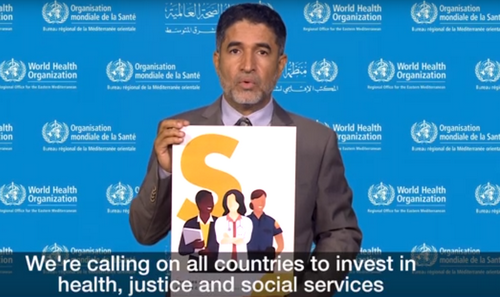27 November 2019 – Every year the 25 November marks the start of 16 days of activism against gender-based violence. This global campaign aims to commemorate the victims of gender-based violence, to celebrate the survivors and to raise awareness, stimulate advocacy efforts and share knowledge and innovative ideas for fighting violence against women and girls. The campaign ends on the 10 December, Human Rights Day.
This is not a coincidence. Women’s rights are human rights: the right to a life free from violence, the right to access to services, the right to be connected to resources in the community, and the right to be heard and believed.
Globally 1 in 3 women or over 800 million worldwide experience physical and/or sexual violence by an intimate partner or sexual violence by any perpetrator. Many more also experience psychological abuse. The Eastern Mediterranean Region has the second highest prevalence rate globally (37%).
Gender-based violence is preventable and its devastating effects can be contained
This year, on the occasion of the 16-day campaign, WHO sheds light on the RESPECT women framework for preventing violence against women, a joint effort of WHO and international partners within and beyond the United Nations. The framework aims to aid policy-makers and health implementers in designing, planning, implementing, as well as monitoring and evaluating interventions and programmes using 7 strategies to prevent violence against women. The letters of the word “R.E.S.P.E.C.T.” refer to these 7 strategies:
- R –elationships skills strengthened
- E –mpowerment of women
- S –ervices ensured
- P –overty reduced
- E –nvironments made safe
- C –hild and adolescent abuse prevented
- T –ransformed attitudes, beliefs and norms.
This prevention framework complements ongoing WHO efforts to strengthen the health system response to violence against women in countries of the Region both in development and emergency contexts. Efforts have been put in place to ensure an adequate, compassionate, survivor-centred response to gender-based violence within the health system. Ongoing efforts include adaptation of WHO guidance into national policies and protocol to local contexts, capacity-building of health providers and managers, research on quality of health services, production of Information, Education and Communication materials in Afghanistan, Egypt, Iraq, Libya, Morocco, Pakistan, Palestine, Somalia, Sudan, Syria, and Tunisia.
Besides these efforts, in 2020, the WHO Regional Office will support countries to prevent violence against women, based on the RESPECT framework. Supporting countries to strengthen community-based interventions, such as raising community awareness on gender-based violence and its health implications has already started in Syria.
In October 2019 a first workshop on gender-based violence and mental health was conducted with nongovernmental organizations and directorates of health from different governorates.
“Through the workshop I have learned how to deliver messages on gender-based violence and health to communities, how to elaborate on sensitive topics in a way that is understood, acceptable and useful. I have also learned how to make sustainable plans to reach as much people as possible” said one of the participants.
Violence against women is a major public health and human rights issue. The health system and humanitarian health actors have a core role and stake in preventing violence and responding to survivors by providing the necessary services.
Related links
RESPECT women: preventing violence against women
WHO leadership speak about RESPECT
WHO publications on violence against women



